Related Research Articles
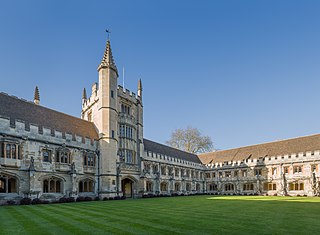
Magdalen College is a constituent college of the University of Oxford. It was founded in 1458 by William of Waynflete. Today, it is the fourth wealthiest college, with a financial endowment of £332.1 million as of 2019 and one of the strongest academically, setting the record for the highest Norrington Score in 2010 and topping the table twice since then. It is home to several of the university's distinguished chairs, including the Agnelli-Serena Professorship, the Sherardian Professorship, and the four Waynflete Professorships.

All Souls College is a constituent college of the University of Oxford in England. Unique to All Souls, all of its members automatically become fellows. It has no undergraduate members, but each year recent graduate and postgraduate students at Oxford are eligible to apply for a small number of examination fellowships through a competitive examination and, for those shortlisted after the examinations, an interview.
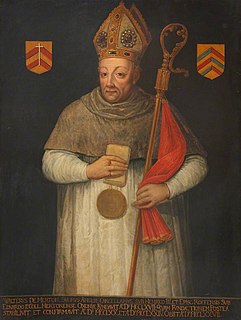
Walter de Merton was Lord Chancellor of England, Archdeacon of Bath, founder of Merton College, Oxford, and Bishop of Rochester. For the first two years of the reign of Edward I he was - in all but name - Regent of England during the King's absence abroad. He died in 1277 after falling from his horse, and is buried in Rochester Cathedral.

Frederic William Maitland was an English historian and lawyer who is regarded as the modern father of English legal history.
The Provisions of Oxford were constitutional reforms developed in 1258 which resolved a dispute between the English barons and King Henry III of England. They asserted the right of the barons to representation in the king's government and, like the earlier Magna Carta, demonstrated the ability of the barons to press their concerns in opposition to the monarchy.
The Vinerian Scholarship is a scholarship given to the University of Oxford student who "gives the best performance in the examination for the degree of Bachelor of Civil Law". Currently, £2,500 is given to the winner of the scholarship, with an additional £950 awarded at the examiners' discretion to a proxime accessit (runner-up).
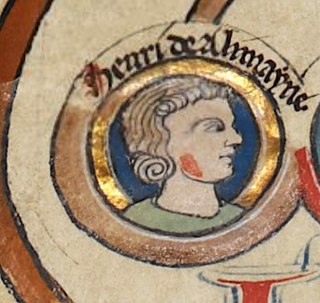
Henry of Almain, also called Henry of Cornwall, was the eldest son of Richard, Earl of Cornwall, afterwards King of the Romans, by his first wife Isabel Marshal. His surname is derived from a vowel shift in pronunciation of d'Allemagne ; he was so called by the elites of England because of his father's status as the elected German King of Almayne.

John Gardner was a Scottish legal philosopher. He was senior research fellow at All Souls College, Oxford University, and prior to that the Professor of Jurisprudence at the University of Oxford and a fellow of University College, Oxford.
John Haffenden is emeritus professor of English literature at the University of Sheffield.
David A. Carpenter is an English historian and writer, and Professor of Medieval History at King's College London where he has been working since 1988. Carpenter specialises in the life and reign of Henry III. Historian Dan Jones described him as "one of Britain's foremost medievalists".
Paul Finkelman is an American legal historian and chancellor of Gratz College, Melrose Park, Pennsylvania. He is a prolific writer and editor of American legal history involving slavery and broadcast media.
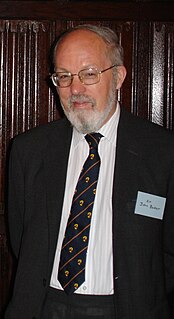
Sir John Hamilton Baker, QC, LLD, FBA, FRHistS is an English legal historian. He was Downing Professor of the Laws of England at the University of Cambridge from 1998 to 2011.
The Provisions of Westminster of 1259 were part of a series of legislative constitutional reforms that arose out of power struggles between Henry III of England and his barons. The King's failed campaigns in France in 1230 and 1242, and his choice of friends and advisers, together with the cost of his failed scheme to make one of his younger sons King of Sicily and help the Pope against the Holy Roman Emperor, led to further disputes with the barons and united opposition in Church and State. Henry's position was not helped by the fact that his lifestyle was extravagant and his tax demands were widely resented. The King's accounts show a list of many charitable donations and payments for building works, including the rebuilding of Westminster Abbey, which began in 1245.
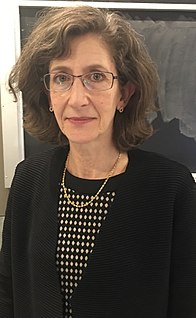
Lucia Zedner, FBA is a British legal scholar, who is Professor of Criminal Justice at the University of Oxford and a senior fellow of All Souls College, Oxford.
Charles Patrick Wormald was a British historian born in Neston, Cheshire, son of historian Brian Wormald.
Richard Wooddeson (1745–1822) was an English jurist, Vinerian Professor of English Law from 1777.
Nicola Mary Lacey, is a British legal scholar who specialises in criminal law. Her research interests include criminal justice, criminal responsibility, and the political economy of punishment. Since 2013, she has been Professor of Law, Gender and Social Policy at the London School of Economics (LSE). She was previously Professor of Criminal Law and Legal Theory at LSE (1998–2010), and then Professor of Criminal Law and Legal Theory at the University of Oxford and a Senior Research Fellow of All Souls College, Oxford (2010–2013).
Richard Michael Smith, FBA, FRHistS is a historical geographer and demographer. He was professor of historical geography and demography at the University of Cambridge from 2003 to 2011, where he is now an emeritus professor, and served as director of the Cambridge Group for the History of Population and Social Structure (1994–2012). He was also a fellow of Downing College, Cambridge, from 1994 to 2010.
Stephen Michael Cretney, FBA, Hon. QC (1936–2019) was a British legal scholar. He was Professor of Law at the University of Bristol from 1984 to 1993 and then a fellow of All Souls College, Oxford, until 2001.
Philippa Mary Hoskin is a British historian of the English Middle Ages, who specializes in the religious, legal and administrative history of the English Church. She is the Fellow Librarian of the Parker Library, Corpus Christi College, Cambridge.
References
- 1 2 "Brand, Prof. Paul Anthony", Who's Who (online edition, Oxford University Press, December 2017). Retrieved 17 June 2018.
- 1 2 "Professor Paul Brand", All Souls College, Oxford. Retrieved 17 June 2018.
- ↑ "The contribution of the period of baronial reform (1258-1267) to the development of the common law in England", EthOS (British Library). Retrieved 17 June 2018.
- ↑ "Notable Hampton Old Boys" (Hampton School). Retrieved 17 June 2018.
- ↑ "Professor Paul Brand", British Academy. Retrieved 17 June 2018.